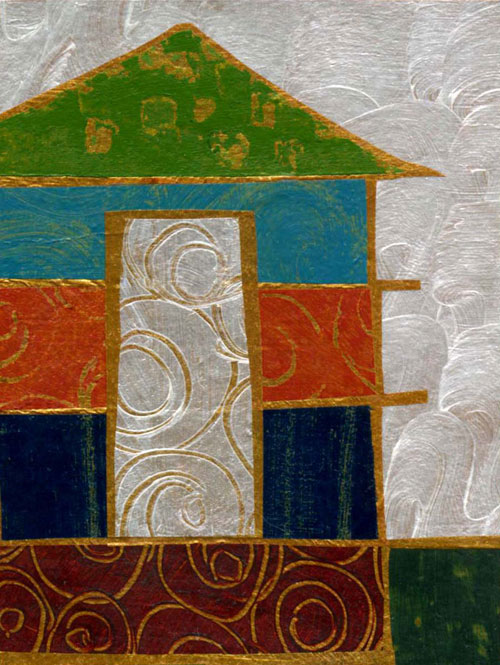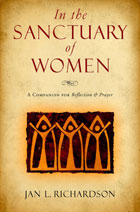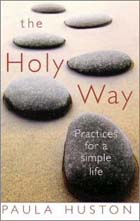
© Jan L. Richardson ◊The Painted Prayerbook◊
When a friend of mine was ready to build a house on the land he had purchased in eastern Kentucky, he sent out a request to some friends. Scott invited us to offer an object, a tangible blessing that he would bury in the ground upon which he would build the house. He recalls that “Folks were amazingly thoughtful—some of the items included tea, Legos and puzzle pieces from my childhood sent by my mother, guitar strings, a bit of climbing rope, a bit of granite from my home town (Lithonia meaning roughly ‘rock place’), a wine chalice from my potter friends, shells from our childhood vacation spot, herbs, bits of plants and dirt from various parts of the country, and chocolate.” After all the gifts arrived, Scott gathered with some friends for a ceremony on his property. Placing the gifts in the ground, they offered a blessing for what would take root in that place. Married now and with young children, Scott and his family flourish in the house built atop the buried blessings.
It was just a few weeks ago, on Easter 5, that we did some reflecting on houses. Pondering Jesus’ words in John 14, where he speaks of the dwelling place he is preparing, we noted how houses are places not only of personal but also collective memory and imagination. Jesus’ words in that passage, as well as in this week’s Gospel lection, underscore the fact that throughout the scriptures, a house is rarely just a physical building. Rather, it evokes a constellation of meanings: a house may refer to a place of worship, the people of Israel, the members of a particular ancestral lineage (as in the house of Jacob), or a group of people who dwell together (a household). Jesus sometimes uses houses to describe the kingdom of God, as in the parable of the woman who sweeps her entire house, looking for her lost coin. Houses also contain a deeply individual meaning, as in this week’s gospel lection, Matthew 7.21-29. Here the image of the house is thoroughly personal, in that it refers to the house that we build with our own particular life, yet it resonates with nearly all the other meanings that house holds. The house that we construct with our life, the house that is our life, is intimately involved with the entire household of God.
In this parable about the wise man who built his house on rock and the foolish man who built his house on sand, Jesus urges us to dig deeper, as it were, into this homely imagery. He challenges us to recognize how the health of a house (and its inhabitants) depends on what we build it upon. The wholeness of the house, he tells us, rests on its foundation. And for Jesus, our tangible response to him forms the foundation of our dwelling with him. Our practices, our searching, our work to live out his call: these acts are blessings that sustain the structure and help its inhabitants flourish.
Jesus makes clear that we can’t cut corners in this kind of house building. There is no shortcut to the kingdom, no substitute for doing the work that’s involved. We are saved by grace alone, but we are called to respond to that grace, to give flesh to our understanding that hospitality is not something we only receive in Christ but that we offer as well. Many of the gospel lections that we’ll journey with during Ordinary Time will speak specifically, and sometimes uncomfortably, to the kind of work that Christ beckons us to do. He emphasizes that it’s not work just for the sake of work (and it’s not constant work, either; rest is one of the ways that we respond to Christ). Rather, our response is for the purpose of relationship. As Jesus highlights in the opening verses of this passage, it’s possible to do really impressive work, work that seems holy on the surface, but is empty because it’s focused on results—on a show of power—rather than on relationship with the one who is the source of true power. “I never knew you” is the lament that Jesus, in Matthew 7.23, predicts he will utter to those who hear but do not respond.
The solidly built house in Jesus’ parable has, like the kingdom of God, a now-and-not-yet quality. The house that he describes is something of a mystical house that stands complete and inhabited, yet which we are also in the process of building. Living together in a house that we are still working on sometimes seems daunting. We can get to feeling like Sisyphus in our perpetual practicing, particularly in those times when we start focusing more on the practices themselves and less on the relationship the practices are designed to cultivate. Too, we don’t always know precisely how the structure will take shape and what it will look like. Our call, however, isn’t always to finish the house but rather to be faithful in laying the groundwork, to discerning and doing the work that’s in front of us, the work that is ours to do.
And here’s a cool thing: don’t gotta do it alone. Aren’t meant, in fact, to do it alone. I think again of my house building friend, how he asked for help and invited others to share in blessing and building the foundation.
What are you building your life on? What are the practices that give wholeness to the house of your life? Are there any places in the foundation that feel shaky? Is there someone you could ask for help as you build? What’s the dream house of your soul look like?
A blessing upon your building.













Leave a Reply